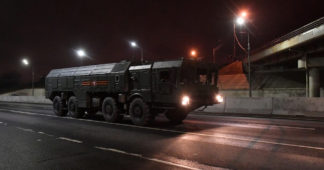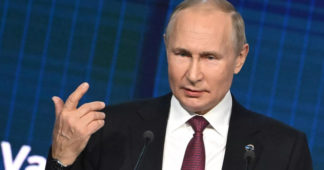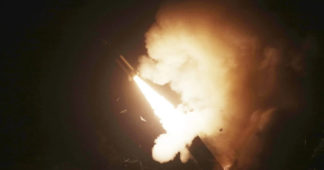Speech by Christos Marsellos, Delphi Initiative, Defend Democracy Press, Author, Greece, at the European Conference on 2 November 2024
The dual need: new geopolitical balance, new social pact
There can be no doubt: we are experiencing an acceleration of history. This could lead to the catastrophic prospect of a world war, potentially involving nuclear weapons. In times like these, the first question is always: Was all of this inevitable? The answer is a resounding no.
The war in Ukraine would not have occurred without NATO’s successive waves of expansion. While some argue that the freedom of peoples to choose their alliances is paramount, we must counter this with the principle – professed by Europe itself – that such choices should not come at the expense of others‘ security. Russia warned against NATO’s expansion into Georgia and Ukraine, yet these warnings were consistently ignored; a new European security pact was never discussed. At the same time, the United States kept unilaterally withdrawing from several treaties concerning medium-range missiles and nuclear arms.
Moreover, in a divided country like Ukraine, NATO membership necessitated forced unification and the suppression of the voices of the Russian and pro-Russian population, which is far from a small minority. The violence that erupted after the events of 2014, marked by atrocities against Russian-speaking citizens – atrocities largely overlooked by Europe – has resulted in a war that has claimed hundreds of thousands of innocent lives. Especially in Crimea and the Donbas, the principle of self-determination was at stake, albeit in a manner that contradicts Europe’s claims. Those who dismiss the legitimacy of the referendums in these regions overlook the fact that Russians and pro-Russians constitute a vast majority.
Russia might have used these regions as leverage to influence Ukraine’s direction, a move justified by the realities on the ground. In contrast, the push for forced unification requires a greater degree of manipulation, creating an artificial narrative that disregards local realities. One cannot claim that the inhabitants of Eastern Ukraine are Ukrainians while simultaneously denying them the right to shape their country’s future.
The Western camp seemed to believe that Russia would either not respond or would be overwhelmed by sanctions, which led them to discourage any thoughts of peace early in the conflict. As a result, Ukraine is now suffering from this Western hubris, which risks escalating to catastrophic levels through the deployment of ground troops or deep strikes into Russia. The line between bluffing and losing control is perilously thin, and this could ultimately lead to nuclear holocaust.
In the Middle East, October 7 has become a date etched in our memories, marking the beginning of a bloody Israeli operation that has already claimed tens of thousands of innocent civilian lives. We hear that Israel has the right to defend itself, and while that is true, such defense should not come at the expense of civilians, who are suffering unprecedented losses. By simply stating this, we are often accused of legitimizing the atrocities committed against Israeli civilians on October 7. Of course we cannot legitimize them. But it is not as if we were the judges. We are in fact responsible for them, because without our apathy, the despair of the Palestinians would not have led them to commit these atrocities. If they are not excused by what they have suffered for decades, Israel’s bloody vengeance is not to be excused either. By its disproportion it is an absolute disgrace.
I come from a country that, on a much smaller scale, has experienced similar phenomena. During the Second World War, there were numerous instances where the Nazis, in retaliation for the loss of one or two soldiers, exterminated the entire male population of a village or a significant number of individuals in cities. Do I harbor resentment towards Germans for this? I do not; there is no such thing as collective guilt.
Some Israelis might argue that there is no comparison, asserting that they are merely defending themselves and that anti-Zionism is a guise for anti-Semitism. I challenge that notion. I do not harbor negative feelings toward Jews as a collective, because, once again, there is no such thing as collective guilt. However, we must further nuance this discussion. The issue is not about Zionism per se, but rather about a policy that no human being can condone. Many Jews worldwide reject the actions of the current Israeli government, viewing them as madness that perpetuates violence for generations. Are they to be labeled as anti-Semites?
The truth is that there is no way out of this situation without negotiation and justice for both sides involved. Conversely, we face a dire outcome for everyone, especially if those seeking to provoke a broader conflict – driven by their desire for a final confrontation with Iran – are allowed to prevail. One might even question whether Israel could survive such cataclysmic waves for long. It is not Israel’s enemies but its friends who should advocate for pressure on its government to end this cycle of horror.
Now, we are concerned that these wars may escalate into total war; but we are also worried about their impact on our civil societies. Can we ensure that these conflicts will not result in social unrest, driven by suppressed living standards and intensified class struggles that could lead, either spontaneously or through manipulation, to scapegoating of the immigrant population?
We must keep in mind that, to use an old Aristotelian distinction, what is first from our perspective is not necessarily what is first in the nature of things. We observe the pressure on our economies from geopolitical tensions, yet in reality, it is the state of our economies that fuels these tensions. We are not merely spending money that could be better used elsewhere; we are making money. Or, to put it more bluntly, some in the western camp make money, and some others who do not, do not have the courage to simply tell the truth.
Geopolitical tensions arise from an imbalance in global economic realities, where the influence of Western economies is gradually diminishing. This is compounded by an unacknowledged need to maintain, by force, the exorbitant privilege of the dollar as an international currency, along with the broader global fiat money system that enables Western nations to live beyond their means.
It’s not only that Europe lacks the strength to negotiate effectively and contain opposing parties in various conflicts; the EU itself seems to prefer following the hubris of certain Western factions that seek to impose their will, rather than acknowledging that it would not hold the upper hand in negotiations – neither through force nor through justice.
This creates a vicious cycle: as internal tensions rise, our governments may increasingly turn to external enemies to deflect blame for their own shortcomings. This is the primary reason why, without a new social contract, the situation appears hopeless; yet we are far from even establishing the groundwork for it.
We should not expect states and their mechanisms – much less the empires currently at odds – to consider justice; by their very nature, they are driven by the pursuit of power. Only ordinary citizens can demand that their governments focus on justice. To advocate for justice, citizens must understand the true state of affairs. Justice is achieved through truth, especially of the kind often suppressed by mainstream media, which serve an insidiously imposed consensus. Truth is not always comfortable, and justice – both internationally and within our societies – will not be attained without sacrifices.
We remind our readers that publication of articles on our site does not mean that we agree with what is written. Our policy is to publish anything which we consider of interest, so as to assist our readers in forming their opinions. Sometimes we even publish articles with which we totally disagree, since we believe it is important for our readers to be informed on as wide a spectrum of views as possible.











